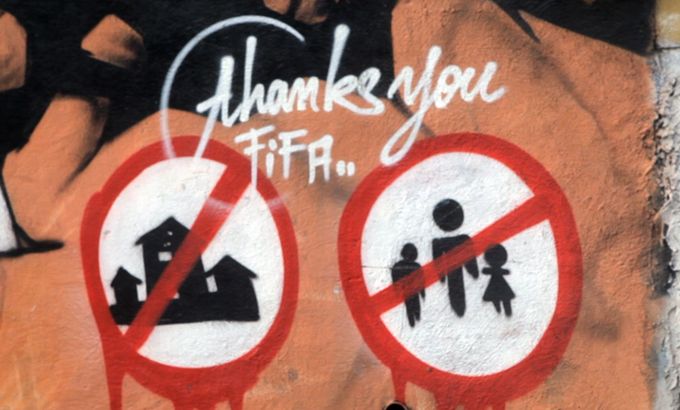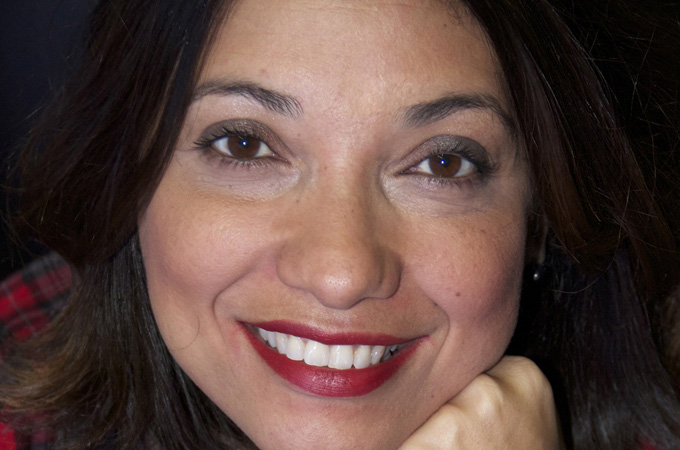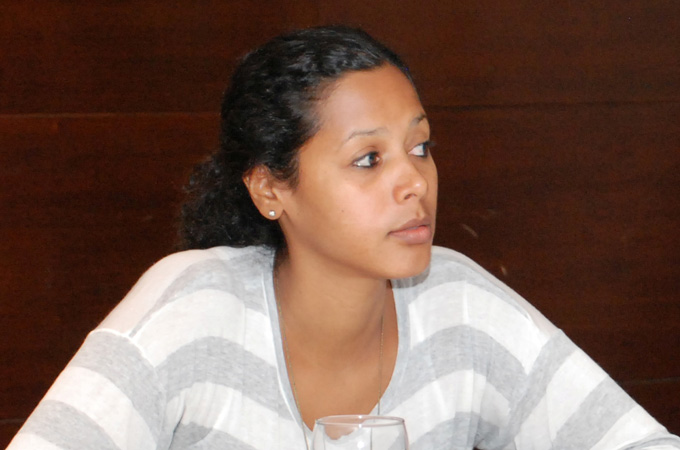
Rio’s Red Card – Brazil
Should one sporting event mean losing your home? In one small but valuable corner of Rio the answer is a very loud: No.
“Without a home you have nothing. And Vila Autódromo is my home, my life is here. If they take my home, they take my identity, my past.”
Altair Guimarães has been displaced from Rio’s favelas before in his life because of the city’s booming growth.
Keep reading
list of 4 itemsUK returns looted Ghana artefacts on loan after 150 years
Fire engulfs iconic stock exchange building in Denmark’s Copenhagen
Inside the pressures facing Quebec’s billion-dollar maple syrup industry
But today he is leading the protests in the Vila Autódromo favela which stands in the path of the 2016 Olympic Park site.
We will follow Altair as he rallies his community and fights with the mayor to defend his home and the homes of thousands of fellow favela residents while everyday they face the thunderous approach of the Olympic Games.
|
Brazil is busy preparing for the 2014 World Cup and the 2016 Olympics. The country is upgrading its infrastructure, building new arenas, and has plans for a vast new Olympic Park. In the path of all of these changes are the sprawling favelas, home to an estimated 170,000 people. Many of these areas have already been demolished but many others still stand in the path of construction. It is estimated that approximately one-fifth of the city’s population lives in these areas and will be permanently displaced for these two sporting events; 8,000 people have already been evicted. |
FILMMAKER’S VIEW
By Susanna Lira
I was born and raised in Rio. It is undoubtedly a marvelous city, but one filled with contrasts where we see human rights being violated far more than we would like.
Director Susanna Lira is a Brazilian documentary maker with 19 years’ experience in television. Her first feature documentary, Positivas , examined the growing number of Brazilian women infected with HIV/AIDS and won the best documentary prize at Rio’s international film festival. She is currently working on a documentary about absent fathers in Brazilian society.
Producer Luciana Freitas has been producing documentaries and television programmes for nearly 16 years. In partnership with Susanna Lira, she has made a series of socially-minded films and developed projects with other filmmakers in Brazil and elsewhere. Most recently, she produced In Search of the Father – a five-part series for Brazilian television about paternal absence. |
Rio is now gearing up to put on two of the world’s biggest sporting events. In 2014, it will host the final of the football World Cup; in 2016, it will be the setting of the Olympic Games.
I have witnessed how the city is changing, and changing fast, as a result.
Huge infrastructure projects have been launched to prepare the city for these events. In order to make way for new highways and transport infrastructure many families have lost their homes.
Many others are still fighting to save their homes, their backgrounds and their communities. They are fighting eviction. They are trying to prove that it is possible, and that it is just, for them to remain where they are. And they believe that their rights to the land and housing are being violated.
Above all, I wanted to hear what these people thought. I wanted to get to know their struggle and to tell others about it.
Our main character is Altair Guimarães, the president of Vila Autodromo, a community of some 3,000 residents which is located on the same land on which the town hall wants to build the Olympic Park.
In the 40 years since it was founded, Vila Autodromo has successfully fended off other attempts to demolish it. But with the Olympics now on Rio’s horizon, things have become trickier.
The value of the area’s real estate has gone through the roof. Eviction is a real and present danger. The mayor has vowed that the community will have to be removed.
Meanwhile, Altair and the residents are battling to prove that they can be allowed to stay, without harming Rio’s Olympic renovation plans.
The future is unclear. Altair, who has already been evicted twice in the 57 years of his life, is fighting not just for the sake of other residents but for his own family. If his community is evicted, Altair says he will be the last to leave.
I have seen how these people will fight until the very end.
They are not opposed to progress or the Games but they are people who want to look to the future, without losing their past. Altair believes his community and his family should not pay such a high price for a sporting event that will last just 30 days.
The Olympics Games will come and go. Rio de Janeiro will remain. I hope they will be able to carry on as part of this vibrant city.
Q&A with Susanna Lira
Viewfinder: Why did you want to make this film?
I have worked as a journalist for many years in Brazil. I used to work for TV news and I have always had problems with the news format. In the documentary I wanted to tell the story of people who are living through the period leading up to the Olympics and the World Cup. So we try to get to the truth of those people and how they are suffering the consequences of these major events. So it’s been a very inspiring project. It’s taken a lot of my time, but I’ve been able to get to know these people much more than if I’d been covering them for a news show. I’ve been able to get closer to them and that is when you can tell a story that is more authentic.
Around the world, Brazil has become known for films like City of God . What techniques have you used to tell this story?
Films like City of God and Elite Force are very important. But I do think that those people who live in those communities are stigmatised for living in a certain way and for reacting in a certain way as if everyone is the same. Our film tries to show another side in which those people who live in the favelas are not cliché, desperate, sub-humans. It’s not necessarily like that – many live like any other family, they are organised, they are politicised and our film shows those people outside of the stereotype. The people in our film live in the community, they are not victims of the system and they actually fight against those kinds of emotions. They fight against human rights violations. They are citizens and they are taking ownership of their lives. They are empowered people.
What role does an event like Viewfinder and the workshop you attended have in your work?
I think that the workshop with Al Jazeera was very interesting because it showed us a lot about observational documentary. We have a tendency to do a lot of interviews [in Latin America] but this process meant that we gradually started observing more, we got closer to the protagonists, what they did, how they lived. So I think that it was very important because we learned different tools and I think this was very important for us to learn about how to make more observational documentaries.
What would you like the next gathering of Viewfinder filmmakers to know as they go into the next Open Call?
Al Jazeera is an important international broadcaster, it was great to be doing a workshop with them, filming with them and participating. But I think that what is most important about what I have seen on the other films I have seen on Witness is I don’t know if you would see them anywhere else. They are very special films. The film I wanted to do no one is really interested in here because it’s a film that shows things that are not entirely positive about this country. It will no doubt help Brazil to reflect on certain things, especially at this moment, with the World Cup and the Olympics coming up. People will learn a bit more about this country before people come to see these big events. If Al Jazeera doesn’t do this kind of film, no one will. Unfortunately, most media outlets are more about entertainment. So I feel very happy about being able to tell this story – and I hope that you will also feel that responsibility and that conscience to be able to tell that story about your country and about those people who would never be seen if a programme like this did not exist.

